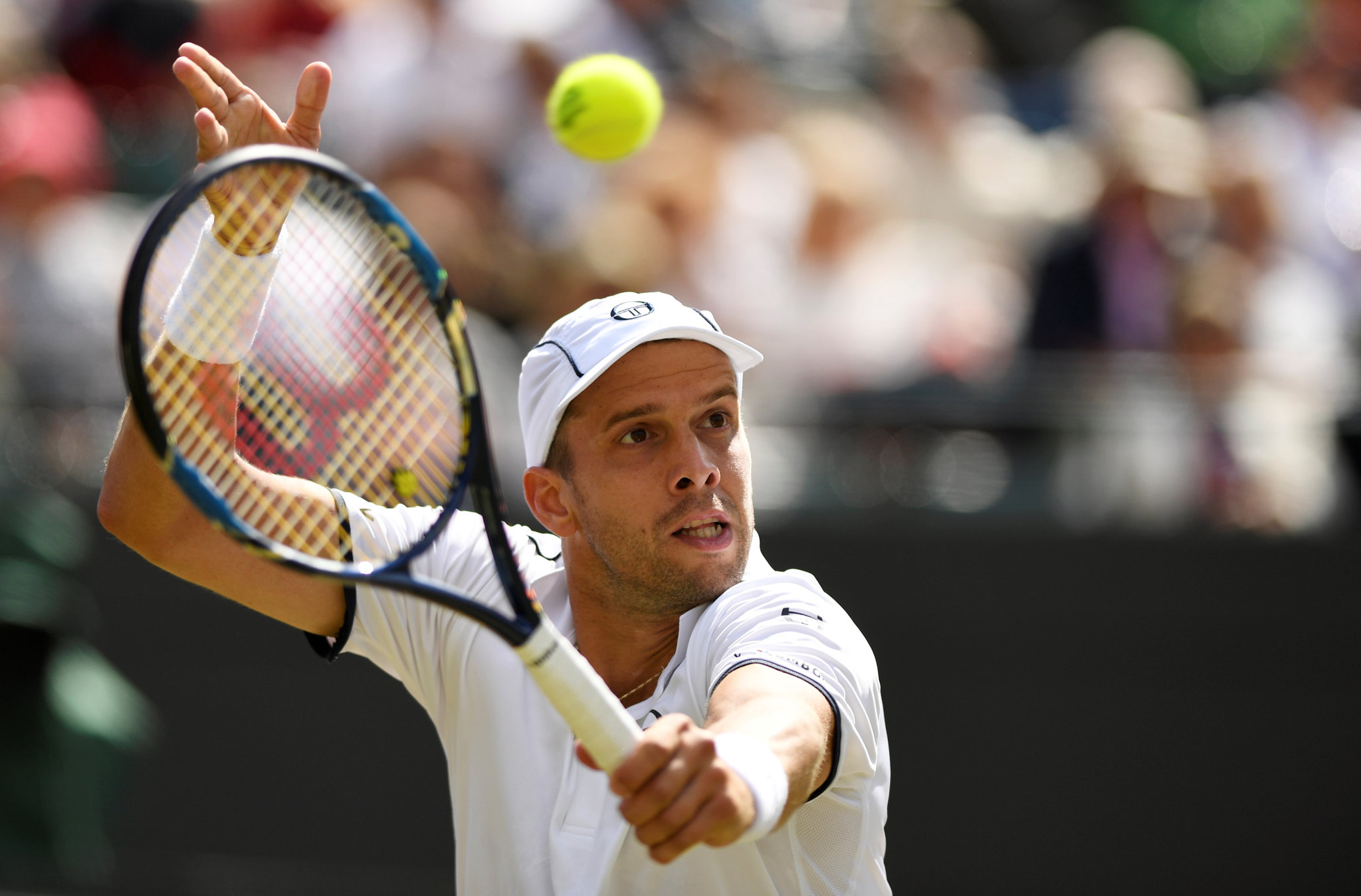
Gilles Müller Finds Success in Tennis at an Age When Others Retire
“Now, I’m playing free and not thinking about that first title anymore. That’s helped me a lot.”

Credit
Tony O’Brien/Reuters..
The title in Sydney left him in tears after the match as he thanked his coach and family, including his wife, Alessia Fauzzi, and their young sons, Lenny and Nils.
Try watching this without a tear in your eye! Gilles Muller in bits after winning ATP Sydney in front of his family. pic.twitter.com/saFzQSlrdM
—
Eurosport UK (@Eurosport_UK)
Jan. 14, 2017
“There’s nothing better or bigger than having your boys with you and seeing them in the stands when you lift trophies or when you’re having success,” Müller said. “Now they’re starting to understand what I do, and they play tennis themselves, so it’s a lot of fun and obviously a lot of pride when I can live those moments with them and with my wife.”
Müller’s success this season extended to the Grand Slam level, where he outlasted Rafael Nadal, 15-13, in a fifth set to reach the Wimbledon quarterfinals, a result that helped propel him to a career-high ranking of No. 21.
In the past, Müller could not parlay breakthrough wins into any subsequent success of note. He upset Nadal at Wimbledon in 2005, and a few months later, Müller stunned Andy Roddick in the first round of the United States Open.
“That was one of the key moments of my career,” Müller said of 2005. “I was quite young and coming up, and with those wins — I beat Nadal at Wimbledon and then Roddick — and all the attention I got from the media and people talking to me, I didn’t cope well with it.

Credit
Shannon Stapleton for The New York Times
He added: “All the attention I got, I took it the wrong way. In my head, I’d made it. I took it for granted, and I think that was not a good moment.”
As he played against Roger Federer at the 2008 U.S. Open, the television commentator John McEnroe said that Müller had underachieved, though his serve, size and his being left-handed suggested great potential.
“That is why there was this belief and expectation that he was going to get to the top,” McEnroe said at the time. “Now, is he as good of an athlete as some of the other top guys? No. Has he dedicated himself and conditioned himself perhaps as well as some of the others? Doesn’t look like it. But he’s got some game.”
It would be three more years before Müller cracked the top 50. Then he missed the second half of the 2013 season with an elbow injury. He used that forced absence to improve his fitness, which had always been a weakness.
“I wasn’t able to touch a racket for at least five months, and I used that time to get myself into the best shape I’ve ever been in,” Müller said. “Now, I’m able to play full seasons without any breaks, playing lots of matches, and that gives you a lot of confidence — especially a lot of confidence in my body, which I didn’t have before. Before, I didn’t know when to stop or when to keep pushing; I didn’t find the right balance.”

Credit
Matthew Stockman/Getty Images
One of the major challenges for Müller, the son of a postal worker, had been geographic. Born and raised in Luxembourg, a small country with no tennis tradition, he was left without career guidance or a federation able to support him financially. If he had been born 20 miles to the south in France or 20 miles to the east in Germany, his career might have played out very differently.
“You never know what could have happened,” Müller said. “If you look at all the French players which I’m friends with, they obviously had so much help from the federation. Even now in their 30s, they have a physio traveling with them and it’s the federation who is paying. If you’re born in a big country and play for a big country, the help around is different. You also have players that have played on the top that can help you as role models to guide you.”
But there was at least one positive to being out of the tennis spotlight. “I didn’t feel that pressure as guys from a big country do,” Müller said. “If you have a few big results, people think you’re going to be No. 1. You’re in the press, and some of those guys have been on the cover of magazines at age 12 or 13.”
Excitement has mounted for Müller in Luxembourg this year, which he said he had not expected. It may well continue. Now on the cusp of breaking the top 20 for the first time, Müller is part of a cohort of players in their mid-30s, which includes Federer, Feliciano López and Ivo Karlovic, who have extended their careers on improved fitness and aggressive, purposeful play.
“He’s playing great, and he’s improved,” Nadal said. “He always served very well, but now he’s playing much better from the baseline, too. It’s a big improvement, and well done by him. It’s difficult to do what he’s doing.”
Müller acknowledged that he did not have “another 10 years on the tour,” but he is showing no signs of slowing down.
“A lot of things have happened this year, and it makes me very happy, too, see that I was able to achieve a lot of big goals that I had in my career,” he said. “It also gives me a lot of motivation to keep going, because I think I’m able to do more things than what I did so far.”
Continue reading the main story


